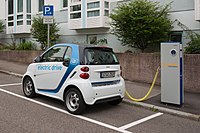Plug-in electric vehicles in Minnesota
As of February 2021[update], there were about 19,000 electric vehicles in Minnesota, equivalent to about 0.25% of cars in the state.[1] As of May 2022[update], about 3% of all new vehicle sales were electric.[2]
Government policy
[edit]In 2021, Republicans in the state legislature proposed a bill that would tax electricity used to charge electric vehicles at public charging stations, in order to offset the lack of gasoline taxes collected from them.[3]
As of 2020[update], there were 37 electric vehicles and 116 plug-in hybrid vehicles in the state fleet.[4]
Charging stations
[edit]As of June 2021[update], there were about 1,200 public charging stations in Minnesota.[5] As of August 2022[update], there were 55 public DC charging stations.[6]
The Infrastructure Investment and Jobs Act, signed into law in November 2021, allocates US$68 million for charging stations in Minnesota.[7]
Economic impact
[edit]There have been concerns about negative economic impacts from EV-induced loss of demand for biofuels, which comprise a large portion of agriculture in Minnesota.[8][9]
By region
[edit]Minneapolis–Saint Paul
[edit]As of April 2022[update], 2.7% of all new vehicles registered in the Minneapolis–Saint Paul metropolitan area were electric.[10]
In February 2022, the cities of Minneapolis and Saint Paul launched Evie Carshare, the largest public electric vehicle car-sharing program in the United States.[11]
Rochester
[edit]The first electric bus in the fleet of Rochester Public Transit was introduced in July 2022.[12]
References
[edit]- ^ Halter, Nick (May 11, 2021). "Minnesota makes a play to get more electric vehicles on the road". Axios. Retrieved March 27, 2022.
- ^ Raddatz, Kate (May 9, 2022). "With Gas Prices Spiking, Is It More Affordable To Opt For An Electric Vehicle?". WCCO. Retrieved May 25, 2022.
- ^ Hertel, Nora G. (March 3, 2021). "Tax electricity as fuel: St. Cloud-area lawmaker, electric vehicle owner agree on this one". The St. Cloud Times. Retrieved March 27, 2022.
- ^ Orenstein, Walker (March 4, 2021). "Electric vehicles are coming to Minnesota. Republicans and Democrats have very different ideas on how state government should respond". MinnPost. Retrieved May 25, 2022.
- ^ Hackett, Ashley (August 12, 2021). "Infrastructure Bill Allocates Big Bucks for Minnesota's Electric-Vehicle Charging Network". Twin Cities Business. Retrieved March 27, 2022.
- ^ Hughlett, Mike (August 2, 2022). "Xcel's $300M electric vehicle plan includes 730 high-speed chargers in Minnesota". Star Tribune. Retrieved September 12, 2022.
- ^ "State's electric vehicle drivers could get a charge out of federal funding". Minnesota House of Representatives. February 15, 2022. Retrieved March 27, 2022.
- ^ Zurn, Karolyn (February 15, 2021). "PRO-CON / Should Minnesota embrace electric vehicles? No, Walz can block farmer-harming California mandates". The Duluth News Tribune. Archived from the original on March 28, 2022. Retrieved March 27, 2022.
- ^ Whalen, Deb (January 13, 2022). "Letter: The realities of a discriminatory electric vehicle mandate in Minnesota". Inforum. Archived from the original on January 17, 2022. Retrieved March 27, 2022.
- ^ Halter, Nick (June 29, 2022). "Minnesotans are slow to embrace electric vehicles". Axios. Retrieved September 12, 2022.
- ^ Turtinen, Melissa (February 3, 2022). "Twin Cities launch new electric vehicle car-share program, charging stations". Bring Me The News. Retrieved March 27, 2022.
- ^ Corey, Chad (July 8, 2022). "Rochester's first battery electric transit buses hit the streets next week". KAAL. Retrieved December 20, 2022.


